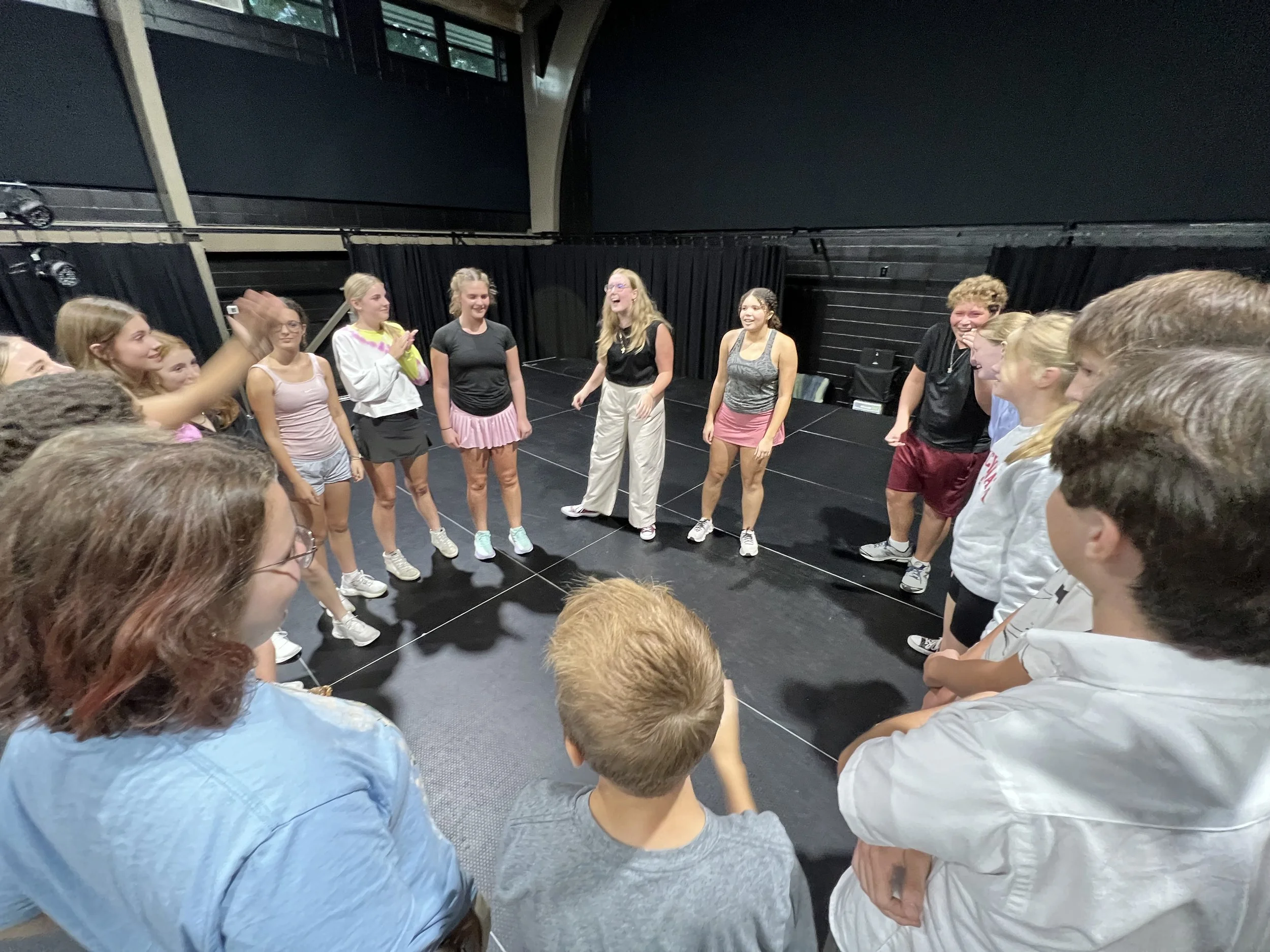Leadership Over Lead Roles: The Magic of Ensemble
Imagine this: It’s a typical day in our rehearsal studio, the walls bare, the floor scuffed from years of use. There’s no set yet, no costumes, no dazzling lights—just a group of young performers, their voices echoing slightly in the empty space. The cast of Disney’s The Little Mermaid gathers, some excited, some unsure. Among them, The Sirens—roles I crafted specifically for this production—stand in a small circle, looking around, their faces a mix of curiosity and doubt.
Group of students prepares for a production.
They don’t have lines. No monologues, no solos. Just movement. Just presence. And at first, that seems like a disadvantage. You can see the uncertainty in their eyes, hear the whispers of “Why am I doing this?” or “Is my role even important?” There are no costumes to step into yet, no beautiful sunset to act against—just their imaginations and the trust they’re starting to build with each other. But as rehearsals progress, something beautiful begins to happen.
The Sirens, through their fluid movements and the way they weave in and out of scenes, start to guide the entire mood of the show. They set the tone with the grace of their dance, subtly steering the emotions of the audience. The more they lean into their roles, the more they realize the power they hold. By the time we reach the final rehearsals at Theatre on the Bluff, with the sun setting over Mobile Bay, these young performers know—they are essential to the story we’re telling. They’ve discovered that leadership doesn’t always come with a spotlight; sometimes, it’s found in the quiet, guiding force that shapes the entire narrative.
Theatre on the Bluff in Fairhope, AL. Last rehearsal before The Little Mermaid.
This isn’t just a lesson for the stage—it’s a lesson for life. Because real leadership isn’t about how many lines you have or how big your role is. It’s about what you bring to the ensemble, how you support your team, and the creativity you pour into every moment, whether or not you’re standing front and center.
The Power of the Ensemble
Let’s get real: The lead role may catch the eye, but the ensemble is the heartbeat of any production. The energy, movement, and life that the ensemble brings is what makes a story resonate. It’s easy to overlook this, especially when the world is so focused on individual achievement—on who’s in the spotlight, who’s getting the applause. But the truth is, success, both on stage and off, comes from the collective effort of everyone involved.
One of the dancing sirens in Eastern Shore Repertory Theatre's The Little Mermaid.
Think back to The Sirens. No speaking parts. No solos. And yet, they were the ones who moved the audience, who created the emotional undercurrent that carried the entire show. Their roles weren’t about the number of lines they had; they were about the impact they made. They learned, and we all learned, that creativity isn’t measured in words—it’s felt in every breath, every movement, every silent moment where the audience holds its breath.
And here’s something important: The best stories happen when we stand together, not when we stand alone. It’s in these moments of togetherness that we find our true strength, and that’s where the magic truly begins.
Dancing Sirens in Eastern Shore Repertory Theatre's The Little Mermaid
Embracing Every Role
So here’s the thing: Life isn’t about getting the lead every time. It’s not about counting lines or measuring your worth by the size of your role. It’s about showing up, doing the work, and finding your place in the ensemble. It’s about understanding that your contribution matters, no matter how big or small it may seem. Because when we all bring our best, when we all support each other, that’s when the magic happens. That’s when we move from just telling a story to creating an experience. From just playing a role to leading a movement.
And this isn’t just about theatre. This is about life—about classrooms, families, communities. It’s about recognizing that true leadership isn’t about being the loudest voice in the room; it’s about being the voice that lifts others up. It’s about knowing when to step back, when to let others shine, and how to elevate the entire ensemble.
The Beauty of Collective Success
The Ensemble of Eastern Shore Repertory Theatre's Godspell Cast. Central Park, New York City
I’ve stood in Central Park, surrounded by the cast of our 50th annual production of Godspell, and watched as the ensemble brought the story to life. The sun filtering through the trees, the hum of the city just beyond, the energy of dozens of young performers united in their purpose. There was no single star that day—just a team, working together, lifting each other up, each member contributing to something far greater than any one of them could achieve alone.
Godspell Cast in Central Park, NYC warming up before performance.
This is the heart of what I’ve learned and what I share as I travel from school to school, theatre to theatre. The belief that the greatest stories are those we tell together. That the most powerful performances come not from one voice, but from a chorus. That leadership isn’t about standing in front of the group, but about being part of the group, guiding, supporting, and creating something extraordinary together.
Here’s What I Want You to Remember
Whether you’re stepping onto a stage, into a classroom, or into a family dinner, embrace your role—whatever it may be. Find the value in it. See how it connects with the roles around you. Understand that what you bring to the table matters, even if it’s not the largest piece of the puzzle.
Because when we all bring our best, when we all support each other, that’s when the magic happens. That’s when we create something beautiful, something lasting, something that transcends the sum of its parts.
So here’s to the ensemble. To those who find their voice in supporting roles, to those who lift up every member of their team, to those who see the value in every part they play. Let’s celebrate the magic we create together. Because in the end, it’s not about the lead roles—it’s about the leadership that emerges from the ensemble, from the quiet strength that comes from knowing that together, we are so much more than we could ever be alone.
Godspell's Ensemble creates the show.







